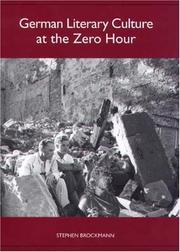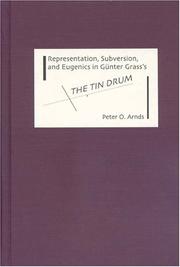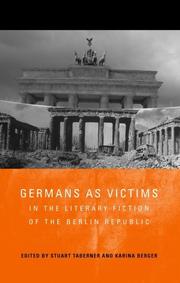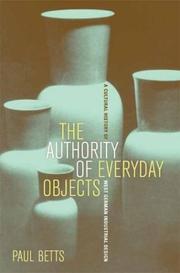| Listing 1 - 10 of 11 | << page >> |
Sort by
|
Book
ISBN: 1501730665 9781501730665 9781501730672 1501730673 9781501726545 1501764586 Year: 2018 Publisher: Ithaca, NY : Cornell University Press,
Abstract | Keywords | Export | Availability | Bookmark
 Loading...
Loading...Choose an application
- Reference Manager
- EndNote
- RefWorks (Direct export to RefWorks)
Since his death, the writings of Carl Schmitt (1888-1985) have been debated, cited, and adopted by political and legal thinkers on both the left and right with increasing frequency, though not without controversy given Schmitt's unwavering support for National Socialism before and during World War II. In Perilous Futures, Peter Uwe Hohendahl calls for critical scrutiny of Schmitt's later writings, the work in which Schmitt wrestles with concerns that retain present-day relevance: globalization, asymmetrical warfare, and the shifting international order. Hohendahl argues that Schmitt's work seems to offer solutions to these present-day issues, although the ambiguity of his beliefs means that Schmitt's later work is a problematic guide. Focusing on works Schmitt published after the war-including The Nomos of the Earth, Theory of the Partisan and Political Theology II-as well as his posthumously published diaries, Hohendahl reads these works critically against the backdrop of their biographical and historical contexts, he charts the shift in Schmitt's perspective from a German nationalist focus to a European and then international agenda, while attending to both the conceptual and theoretical continuities with his prewar work and addressing the tension between the specific circumstances in which Schmitt was writing and the later international appropriation. Crossing disciplines of history, political theory, international relations, German studies, and political philosophy, Hohendahl brings Schmitt's later writings into contemporary discourse and forces us to reexamine what we believe about Carl Schmitt.

ISBN: 1281949264 9786611949266 1571136525 1571132988 Year: 2004 Publisher: Rochester, N.Y. : Camden House,
Abstract | Keywords | Export | Availability | Bookmark
 Loading...
Loading...Choose an application
- Reference Manager
- EndNote
- RefWorks (Direct export to RefWorks)
In the immediate aftermath of the Second World War, German intellectuals and writers were forced to confront perhaps the most difficult complex of problems ever faced by modern intellectuals in the western world: the complete defeat and devastation of their country, the crimes of the Hitler dictatorship, the onset of the Cold War, and ultimately the political division of the nation. To a large extent these debates took place in literature and literary discourse, and they continue to have pressing relevance for Germany today, when the country is rediscovering and exploring this previously neglected period in literature and film. Yet the period has been neglected in scholarship, and is little understood; for the first time in English, this book offers a systematic overview of the hotly contested intellectual debates of this period: the problem of German guilt, the question of the return of literary and political émigrés such as Thomas Mann, the relevance of the cultural tradition of German humanism for the postwar period, the threat of nihilism, the politicization of literature, and the status of German young people who had been indoctrinated by the Nazis. Stephen Brockmann challenges the received wisdom that the immediate postwar period in Germany was intellectually barren, characterized primarily by silence on the major issues of the day; he reveals, in addition to attempts to obfuscate those issues, a German intellectual-and literary-world characterized by an often high level of dialogue and debate. Stephen Brockmann is professor of German at Carnegie Mellon University. He is the recipient of the 2007 DAAD (German Academic Exchange Service) Prize for Distinguished Scholarship in German and European Studies/Humanities.
German literature --- Literature and society --- Authors, German --- History and criticism. --- History --- Political and social views. --- Germany --- Intellectual life --- Cold War. --- Debate. --- Dialogue. --- Hitler Dictatorship. --- Intellectual Debates. --- Literary Discourse. --- Literature. --- Political Division. --- Postwar Germany. --- Second World War. --- Silence.
Book
ISBN: 9781571139047 1571139044 1782045309 9781782045304 Year: 2015 Publisher: Rochester, New York : Camden House,
Abstract | Keywords | Export | Availability | Bookmark
 Loading...
Loading...Choose an application
- Reference Manager
- EndNote
- RefWorks (Direct export to RefWorks)
Millions of former German soldiers (known as Heimkehrer, literally "homecomers," or returnees) returned from captivity as prisoners of war at the end of the Second World War, an experience that had profound effects on German society and touched almost every German family. Based on extensive archival research and oral history interviews, this book provides the first comprehensive analysis ofthe history of the German returnees, explored as a history of memory, both during Germany's division and after unification. At its core lies the question of how the experiences of war captivity were transformed into individual and collective memories. The book argues that memory of the experience of captivity and return is complex and multilayered and has been shaped by postwar political and social frameworks. Christiane Wienand is a Research Fellow on the AHRC-funded research project "Reverberations of War: Communities of Experience and Identification in Germany and Europe since 1945." She holds a PhD in History from University College London.
Ex-prisoners of war --- Collective memory --- World War, 1939-1945 --- Ex-prisonniers de guerre --- Mémoire collective --- 2ème guerre mondiale --- History --- Prisoners and prisons. --- Histoire --- Prisonniers et prisons --- Germany --- Allemagne --- Former prisoners of war --- Returned prisoners of war --- Returnees --- Prisoners of war --- Divided Germany. --- Former Prisoners of War. --- German History. --- Memory. --- POWs. --- Postwar Germany. --- Reunited Germany. --- World War II.

ISBN: 1571132872 9786611949211 1281949213 1571136495 Year: 2004 Publisher: Rochester, N.Y. : Camden House,
Abstract | Keywords | Export | Availability | Bookmark
 Loading...
Loading...Choose an application
- Reference Manager
- EndNote
- RefWorks (Direct export to RefWorks)
In receiving the Nobel Prize for Literature in 1999, Günter Grass, a prominent and controversial figure in the ongoing discussion of the German past and reunification, finally gained recognition as Germany's greatest living author, a writer of international importance and acclaim. Grass's 1959 novel 'The Tin Drum' remains one of the most important works of literature for the construction of postwar German identity. Peter Arnds offers a completely new reading of the novel, analyzing an aspect of Grass's literary treatment of German history that has never been examined in detail: the Nazi ideology of race and eugenics, which resulted in the persecution of so-called asocials as 'life unworthy of life,' their extermination in psychiatric institutions in the Third Reich, and their marginalization in the Adenauer period. Arnds shows that in order to represent the Nazi past and subvert bourgeois paradigms of rationalism, Grass revives several facets of popular culture that National Socialism either suppressed or manipulated for its ideology of racism. In structure and content Grass's novel connects the persecution of degenerate art to the persecution and extermination of these 'asocials,' for whom the persecuted dwarf-protagonist Oskar Matzerath becomes a central metaphor and voice. This comparative study reveals that Grass creates in the novel an irrational counterculture opposed to the rationalism of Nazi science and its obsession with racial hygiene, while simultaneously exposing the continuity of this destructive rationalism in postwar Germany and the absurdity of a 'Stunde Null,' that putative tabula rasa in 1945. Peter O. Arnds is associate professor of German and Italian at Kansas State University.
Eugenics in literature. --- Grass, Günter, --- Grass, Günter, --- German past. --- Günter Grass. --- Nazi ideology of race. --- Nazi ideology. --- Nazi science. --- Nobel Prize for Literature. --- Stunde Null. --- The Tin Drum. --- asocials. --- destruction rationalism. --- eugenics. --- postwar German identity. --- postwar Germany. --- representation. --- subversion. --- Grass, Gunter,

ISBN: 9781571133939 1571133933 9781571137364 9786612795527 157113736X 128279552X Year: 2009 Volume: *65 Publisher: Rochester, N.Y. : Camden House,
Abstract | Keywords | Export | Availability | Bookmark
 Loading...
Loading...Choose an application
- Reference Manager
- EndNote
- RefWorks (Direct export to RefWorks)
In recent years it has become much more accepted in Germany to consider aspects of the Second World War in which Germans were not perpetrators, but victims: the Allied bombing campaign, expulsions of 'ethnic' Germans, mass rapes of German women, and postwar internment and persecution. An explosion of literary fiction on these topics has accompanied this trend. Sebald's 'The Air War and Literature' and Grass's 'Crabwalk' are key texts, but there are many others; the great majority seek not to revise German responsibility for the Holocaust but to balance German victimhood and German perpetration. This book of essays is the first in English to examine closely the variety of these texts. An opening section on the 1950s - a decade of intense literary engagement with German victimhood before the focus shifted to German perpetration - provides context, drawing parallels but also noting differences between the immediate postwar period and today. The second section focuses on key texts written since the mid-1990s shifts in perspectives on the Nazi past, on perpetration and victimhood, on 'ordinary Germans,' and on the balance between historical empathy and condemnation. Contributors: Karina Berger, Elizabeth Boa, Stephen Brockmann, David Clarke, Mary Cosgrove, Rick Crownshaw, Helen Finch, Frank Finlay, Katharina Hall, Colette Lawson, Caroline Schaumann, Helmut Schmitz, Kathrin Schödel, and Stuart Taberner. Stuart Taberner is professor of contemporary German literature, culture, and society, and Karina Berger, B.A., M.St., is a Ph.D. candidate, both at the University of Leeds, UK.
German literature --- Germans in literature. --- Victims in literature. --- World War, 1939-1945 --- History and criticism. --- Literature and the war. --- History and criticism --- World War, 1939-1945, in literature --- 20th century. --- Allied Bombing Campaign. --- Allied bombing campaign. --- Balance. --- Contemporary Debates. --- Expulsions. --- German Literary Fiction. --- German Perpetration. --- German Responsibility. --- German Victimhood. --- German literary fiction. --- Holocaust. --- Internment. --- Mass Rapes. --- Persecution. --- Postwar Germany. --- Second World War. --- World War II. --- expulsions. --- internment. --- mass rapes. --- perpetration. --- persecution. --- victims.

ISBN: 128236040X 9781417544996 9786612360404 0520941357 159734477X 9780520941359 1417544996 9781417544998 0520240049 9780520240049 9781282360402 9781597344777 Year: 2004 Publisher: Berkeley : University of California Press,
Abstract | Keywords | Export | Availability | Bookmark
 Loading...
Loading...Choose an application
- Reference Manager
- EndNote
- RefWorks (Direct export to RefWorks)
From the Werkbund to the Bauhaus to Braun, from furniture to automobiles to consumer appliances, twentieth-century industrial design is closely associated with Germany. In this pathbreaking study, Paul Betts brings to light the crucial role that design played in building a progressive West German industrial culture atop the charred remains of the past. The Authority of Everyday Objects details how the postwar period gave rise to a new design culture comprising a sprawling network of diverse interest groups-including the state and industry, architects and designers, consumer groups and museums, as well as publicists and women's organizations-who all identified industrial design as a vital means of economic recovery, social reform, and even moral regeneration. These cultural battles took on heightened importance precisely because the stakes were nothing less than the very shape and significance of West German domestic modernity. Betts tells the rich and far-reaching story of how and why commodity aesthetics became a focal point for fashioning a certain West German cultural identity. This book is situated at the very crossroads of German industry and aesthetics, Cold War politics and international modernism, institutional life and visual culture.
Industrial design --- Design, Industrial --- Mechanical drawing --- New products --- Design --- History. --- 20th century german culture. --- 20th century industrial design. --- architects. --- automobiles. --- bauhaus. --- braun. --- cold war politics. --- commodity aesthetics. --- consumer appliances. --- consumer groups. --- cultural identity. --- cultural studies. --- design. --- designers. --- domestic modernity. --- economic recovery. --- furniture. --- germany. --- historical. --- industrial culture. --- industry. --- institutional life. --- international modernism. --- materialism. --- modernism. --- modernity. --- moral regeneration. --- nation state. --- politics. --- postwar germany. --- social reform. --- visual culture. --- werkbund. --- west germany.
Book
ISBN: 1282697706 9786612697708 0520945816 Year: 2010 Publisher: Berkeley : University of California Press,
Abstract | Keywords | Export | Availability | Bookmark
 Loading...
Loading...Choose an application
- Reference Manager
- EndNote
- RefWorks (Direct export to RefWorks)
Highly praised when published in Germany, The Quest for the Lost Nation is a brilliant chronicle of Germany's and Japan's struggles to reclaim a defeated national past. Sebastian Conrad compares the ways German and Japanese scholars revised national history after World War II in the shadows of fascism, surrender, and American occupation. Defeat in 1945 marked the death of the national past in both countries, yet, as Conrad proves, historians did not abandon national perspectives during reconstruction. Quite the opposite-the nation remained hidden at the center of texts as scholars tried to make sense of the past and searched for fragments of the nation they had lost. By situating both countries in the Cold War, Conrad shows that the focus on the nation can be understood only within a transnational context.
Historiography --- World War, 1939-1945 --- Cold War --- History --- Influence. --- Social aspects --- Japan --- Germany --- Historiography. --- america. --- american occupation. --- asia. --- cold war. --- defeat. --- engaging. --- europe. --- fascism. --- german scholars. --- germany. --- global politics. --- historical perspective. --- historical. --- historiography. --- japan. --- japanese scholars. --- lost nation. --- modern history. --- national past. --- nonfiction. --- overcoming dark past. --- overcoming defeat. --- postwar germany. --- postwar japan. --- reclamation. --- reconstruction. --- revised history. --- revisionist history. --- social history. --- surrender. --- transnational context. --- world war ii. --- world wars. --- wwii.
Book
ISBN: 1789200334 Year: 2019 Publisher: New York ; Oxford : Berghahn,
Abstract | Keywords | Export | Availability | Bookmark
 Loading...
Loading...Choose an application
- Reference Manager
- EndNote
- RefWorks (Direct export to RefWorks)
"For many centuries, Germany has enjoyed a reputation as the 'land of music'. But just how was this reputation established and transformed over time, and to what extent was it produced within or outside of Germany? Through case studies that range from Bruckner to the Beatles and from symphonies to dance-club music, this volume looks at how German musicians and their audiences responded to the most significant developments of the twentieth century, including mass media, technological advances, fascism, and war on an unprecedented scale"--
Music --- National characteristics, German. --- Social aspects --- History --- History and criticism. --- German influences. --- bavaria. --- berlin. --- case studies. --- dance. --- engaging. --- europe. --- fascism. --- female musicians. --- german concert halls. --- german culture. --- german democratic republic. --- german music scene. --- german music. --- german musicians. --- german society. --- germany. --- hamburg. --- historical. --- history. --- identity. --- jewish music. --- land of music. --- live arts. --- mass media. --- modern german history. --- munich national theater. --- munich. --- musicology. --- mythology. --- nazi past. --- performing arts. --- politics. --- postwar germany. --- rock and roll. --- technological advances. --- theater. --- theatrical productions. --- wagnerism. --- war.
Book
ISBN: 128343976X 9786613439765 1400841860 9781400841868 9780691153407 069115340X 9781283439763 Year: 2012 Publisher: Princeton : Princeton University Press,
Abstract | Keywords | Export | Availability | Bookmark
 Loading...
Loading...Choose an application
- Reference Manager
- EndNote
- RefWorks (Direct export to RefWorks)
The history of Krupp is the history of modern Germany. No company symbolized the best and worst of that history more than the famous steel and arms maker. In this book, Harold James tells the story of the Krupp family and its industrial empire between the early nineteenth century and the present, and analyzes its transition from a family business to one owned by a nonprofit foundation. Krupp founded a small steel mill in 1811, which established the basis for one of the largest and most important companies in the world by the end of the century. Famously loyal to its highly paid workers, it rejected an exclusive focus on profit, but the company also played a central role in the armament of Nazi Germany and the firm's head was convicted as a war criminal at Nuremberg. Yet after the war Krupp managed to rebuild itself and become a symbol of Germany once again--this time open, economically successful, and socially responsible. Books on Krupp tend to either denounce it as a diabolical enterprise or celebrate its technical ingenuity. In contrast, James presents a balanced account, showing that the owners felt ambivalent about the company's military connection even while becoming more and more entangled in Germany's aggressive politics during the imperial era and the Third Reich. By placing the story of Krupp and its owners in a wide context, James also provides new insights into the political, social, and economic history of modern Germany.
Steel industry and trade --- History. --- Krupp family --- Fried. Krupp GmbH --- Friedrich Krupp GmbH --- Krupp (Firm) --- Krupp (Fried.) GmbH --- Krupp GmbH --- Fried. Krupp AG --- Alfred Krupp. --- Alfried Krupp. --- Bertha Krupp. --- Berthold Beitz. --- English steel. --- Friedrich Alfred Krupp. --- Friedrich Krupp. --- German Empire. --- German industrial culture. --- German industrial recovery. --- German steel industry. --- Germany. --- Gustav Krupp. --- Gustav von Bohlen. --- Helene Amalie Krupp. --- Kaiser Wilhelm II. --- Krupp company. --- Krupp directors. --- Krupp family. --- Krupp. --- Kruppianer. --- NIROSTA. --- Nazi Germany. --- Nazi policy. --- Nazism. --- Nuremberg trials. --- Therese Krupp. --- Third Reich. --- Wilhelmine Germany. --- Wilhelminism. --- World War I. --- World War II. --- armament. --- armaments. --- business development. --- business ethic. --- business expansion. --- business. --- corporate culture. --- demilitarization. --- diplomacy. --- economic depression. --- entrepreneur. --- entrepreneurship. --- family affairs. --- family business. --- financial crisis. --- financial incentives. --- globalization. --- interwar years. --- modern Germany. --- modernity. --- nationalist management. --- naval rearmament. --- political engagement. --- postwar Germany. --- profitability. --- rearmament. --- reinvention. --- social philosophy. --- steel industry. --- steel mill. --- steel production. --- war criminal. --- work ethics. --- History
Book
ISBN: 9781785339103 1785339109 Year: 2018 Publisher: New York ; Oxford : Berghahn,
Abstract | Keywords | Export | Availability | Bookmark
 Loading...
Loading...Choose an application
- Reference Manager
- EndNote
- RefWorks (Direct export to RefWorks)
Established in 1955, the Leipzig International Documentary Film Festival became a central arena for staging the cultural politics of the German Democratic Republic, both domestically and in relation to West Germany and the rest of the world. Screened Encounters represents the definitive history of this key event, recounting the political and artistic exchanges it enabled from its founding until German unification, and tracing the outsize influence it exerted on international cultural relations during the Cold War.
Film festivals --- Cold War in motion pictures --- Politics in motion pictures --- Motion pictures --- 798.43 --- film --- cinema --- filmgeschiedenis --- Koude Oorlog --- Oost-Europa --- communisme --- Duitsland --- DDR --- propaganda --- documentaires --- filmfestivals --- 799.5 --- Film and video festivals --- Motion picture festivals --- Moving-picture festivals --- Video and film festivals --- Performing arts festivals --- Cinema --- Feature films --- Films --- Movies --- Moving-pictures --- Audio-visual materials --- Mass media --- Performing arts --- Political aspects --- film, geschiedenis der filmkunst, overige landen --- filmgenres en -motieven, documentaire films --- History and criticism --- Documentary films --- History and criticism. --- Internationales Leipziger Festival für Dokumentar- und Animationsfilm. --- DOK Leipzig --- International Leipzig Festival for Documentary and Animated Film --- Leipziger Dokfilm-Festival --- Leipzig Film Festival --- Internationale Dokumentar- und Kurzfilmwoche Leipzig --- Cold War Cinema. --- Film Studies. --- Postwar Germany.
| Listing 1 - 10 of 11 | << page >> |
Sort by
|

 Search
Search Feedback
Feedback About
About Help
Help News
News